The first time I met Richard was a moment not soon to be forgotten. Sprinting across the orphanage yard I feared what I was about to encounter as I approached my target: mischievous orphans at the moment obviously up to no good. Through my building anger and limited Spanish, a reoccurring reality at the orphanage was made clear to me yet again: there are just some moments you face where no amount of strength can prepare you for what you can´t believe you are witnessing.
On that day, it was the image of a severely mentally retarded child drowning if you can imagine it in the dirt he was being physically held down in, trying to cry but unable to because of the sheer amount of dirt that caked his face, covered his eyes, and had been shoved along with various pieces of trash into his mouth. In between the frantic movements and the spurts that could only be a failed attempt to cry, I struggled to see the humanity in the children that could do this.
After a moment of shock I disbanded the group of older, ¨more mentally competent" children that did this and picked up this child and took him inside to clean him up. I silently cursed the little brats who treatened to make my tears a routine part of visiting the orphanage, and at the same time, thanked God for delivering this retarded orphan who could easily be described as the most unloved of an already unwanted group into my direct attention.
Rest assured the next chapter of this ever unfolding story is actually a happy one.
Father Engh some weeks back suggested to be less preoccupied with the words that we speak or do not speak, and instead try and focus on the incredible ability in our human capacity to communicate and receive communication in spite of the language barrier that we at times suffocate ourselves with.
And that brings us to Richard. A good part of my time at the orphanage today was spent with Richard in my arms, running around to the other kids and telling them: ¨Quiero presentar mi mejor amigo... Entonces, chicos y chicas, por favor miran a Richard, el rey del mundo.¨ Translation: I want to present my best friend so boys and girls, please look at Richard, the king of the world! (at least that is what I hope I was saying...)I said that little speech over and over, every time with a bit more enthusiasm and excitment as for the first time little Richard through his giggles and smiles, actively was responding to what I was doing.
When I finally said goodbye for the day, a little retarded boy they always told me could not talk spoke volumes as he responded to my words of goodbye with the loudest of cries and struggling, he stumbled toward me with outstretched arms, and as I crouched down to look into his usually nonresponsive eyes, he starred intently back at me for a brief moment before wrapping his little arms around my neck, drawing himself closer to me, and giving me a kiss on the cheek.
Richard, the mentally retarded child has never once spoken a word to me. But today, he communicated something I never would have thought he had the ability to, if only because it is a task I have not been able to do myself: Today, Richard gave me back a bit of the self-worth and dignity I have felt void of, and while he might not be able to teach me the Spanish I am convinced will give me that self worth (imagine having the advanced thought process of a 23 year old adult but only being able to speak like a 5 year old child and you might get a feel for why self worth is such a rarity these days), he overcame his own severe handicaps to allow me to see his own humble but valuable gifts, and in return allow me to see in a way I have struggled at times to see: I am not only called to South America, but in the smallest and most humble of ways, in spite of my own handicaps and limitations, perhaps needed as well. I might change the systematic poverty that defines much of this continent, but maybe I can change one life, one day at a time, and in turn, be open to the change that occurs within me as well.
“All…are caught in an inescapable network of mutuality, tied in a single garment of destiny. I can never be what I ought to be until you are what you ought to be, and you can never be what you ought to be until I am what I ought to be. This is the interrelated structure of reality.” –Martin Luther King, Jr.
We are the generation we've been waiting for- right? Poco a poco, we'll get there. Thoughts, insights, and ponderings of a millennial committed to social justice and empowerment through work with nonprofits and post-graduate volunteer work.
Tuesday, October 31, 2006
Wednesday, October 25, 2006
Ever had a monkey run and jump on you? Only in Bolivia
I wonder how awake he really is... I sat in the back of this van, busy watching the eyes of the driver in the mirror. Were they tired, was he perhaps drunk last night and since we agreed to meet to start the trip at 4 AM, maybe he was still drunk? These were the thoughts I had. I had a flash back to being 15 again and at that lesson in drivers education where they taught us to never cross a double yellow, and more so, never pass another vehicle by entering on coming traffic on a blind curve. As I nervously gripped the seat in front of me, I wondered why they did not teach the same basic lesson in Bolivia. Life is a game of calculated risks, and the math just seems so much more fuzzy in this crazy country. And this day, beginning at 3:45 AM, would be no different.
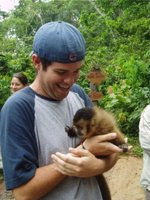
After hours in a crowded van with a driver who seemed to accelerate more when it rained and when we were on unpaved roads, we at last reached our destination, THE JUNGLE! And so this is a glimpse of my crazy weekend in the jungles of Bolivia...
I played with monkeys eager for human attention, and sneaky enough to steal anything in your pockets and disappear into the wilderness once again. I thought the monkeys were crazy until I found myself looking through thick jungle and just 10 feet away making eye contact with a full grown Puma. The leash its master held it on was comforting, a fence would have been a little more comforting, but amenities such as those are hard to come across.
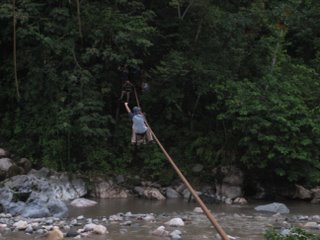
If monkeys and pumas were not enough, I went into the heart of the jungle, via a rope line over a river to view mysterious plants, big insects, and walk into the heart of caves full of bats excitedly flying all around your head, paralyzing your mind.

I tried to visit an Orchid farm, and it being closed, took the advice of our tour guide to just trespassed and spend some time looking at leaves the size of half my body, beautiful flowers, and oh yeah, crocodiles, because that is all part of the experience.
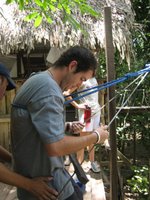
That would have been enough for me but apparently no trip to the jungle is complete without a trip to their amusement park, the Jungle (creative title, no?). This jungle was great, after you got over the fear that the slim piece of wood they called a seat and the rope that went over your shoulder they called a seat belt was anything but secure. All that needs to be said is love me or not, you might want to start paying the small fee for life insurance in my name, it might one day yield great results... Just kiddin, kinda. Something about jumping off a platform, held only by rotting wood, tethered rope, and an old tree branch both frightens and amuses. I was about to do the tallest of the jumps until I saw it go not to well for a friend, and mom you will be proud, it was the first time where my common sense (this is not how I picture my life ending) won out over my ego.
Maybe the life insurance won´t be needed after all, and while some of this might frighten some of you (hi mom) rest assured, I am having the time of my life in the jungle that is metaphorically and physically, Bolivia.
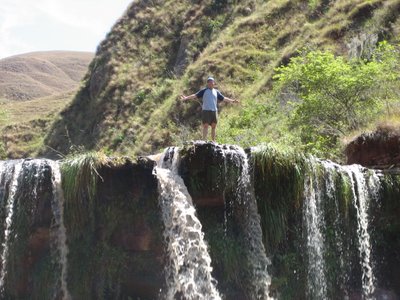

After hours in a crowded van with a driver who seemed to accelerate more when it rained and when we were on unpaved roads, we at last reached our destination, THE JUNGLE! And so this is a glimpse of my crazy weekend in the jungles of Bolivia...
I played with monkeys eager for human attention, and sneaky enough to steal anything in your pockets and disappear into the wilderness once again. I thought the monkeys were crazy until I found myself looking through thick jungle and just 10 feet away making eye contact with a full grown Puma. The leash its master held it on was comforting, a fence would have been a little more comforting, but amenities such as those are hard to come across.

If monkeys and pumas were not enough, I went into the heart of the jungle, via a rope line over a river to view mysterious plants, big insects, and walk into the heart of caves full of bats excitedly flying all around your head, paralyzing your mind.

I tried to visit an Orchid farm, and it being closed, took the advice of our tour guide to just trespassed and spend some time looking at leaves the size of half my body, beautiful flowers, and oh yeah, crocodiles, because that is all part of the experience.

That would have been enough for me but apparently no trip to the jungle is complete without a trip to their amusement park, the Jungle (creative title, no?). This jungle was great, after you got over the fear that the slim piece of wood they called a seat and the rope that went over your shoulder they called a seat belt was anything but secure. All that needs to be said is love me or not, you might want to start paying the small fee for life insurance in my name, it might one day yield great results... Just kiddin, kinda. Something about jumping off a platform, held only by rotting wood, tethered rope, and an old tree branch both frightens and amuses. I was about to do the tallest of the jumps until I saw it go not to well for a friend, and mom you will be proud, it was the first time where my common sense (this is not how I picture my life ending) won out over my ego.
Maybe the life insurance won´t be needed after all, and while some of this might frighten some of you (hi mom) rest assured, I am having the time of my life in the jungle that is metaphorically and physically, Bolivia.

Tuesday, October 17, 2006
Meeting my Great-Grandfather In Bolivia
I saw my great-grandfather today. Walking to school like any other day, but suddenly I noticed him. There he was, sitting in a ditch just outside the gates of the language school. He sat alone and he looked tired. His face was dirty, and his eyes looked lifeless, sadly, even hopeless. But in his face I could clearly see the man who chanced and sacrificed so much for me, never knowing what his efforts would produce. But here we were, me looking at him, clearly seeing a man who escaped the vicious poverty of Ireland that left him little options but to escape to a supposed better life, to become an alien in the land of opportunity. So here I stood, looking at a living face of history: college degree securely behind me, the world optimistically ahead of me. I looked into these curious eyes which looked silently back at me. How would I respond?
I had so much to say to this man, so much built up but as I looked into his brown Bolivian face words were a luxury neither of us would have that day. In the refuge of our shared silence, I could only hope that somehow he knew what was racing through my mind, what I so badly wanted to tell him but at that time, had no ability, perhaps even no right to say.
If I could look into this native and dark Bolivian face and out of it pull the image of my own family, I hoped he could look back at my pale gringo face and somehow in me, see his own kin. I wanted him to know that the poverty which pretty much was assigned to him at birth because of the location of the world he was born into angered me just as much as when I thought about the wretched poverty so many in my family endured in Ireland. I imagined what it would be like if years from now, my path and his were to cross again, but this time in Chicago or Los Angeles, where he had perhaps attempted to escape a life of poverty to claim what was his right as much as anyone else’s: a chance to feed his children and give them an opportunity at a life other than vicious and dedegradingoverty. And so I imagined seeing him in LA, working some difficult dead end job for little pay and no benefits, and I wanted to let him know that illegal would not be the word I would disdainfully use to describe him. For was not my own great-grandfather an alien in a country that promised opportunity, a treasure in his time he perhaps discovered somewhere behind the many signs and want ads that read ¨Jobs available: Blacks and Irish NEED NOT APPLY! ¨
I do not know the real face of the man I would call my great-grandfather. I know he lived in an impoverished land, escaped it and fled to America in pursuit of something more and for that, faced severe discrimination. He endured so much, even his own child, my grandfather, endured so much for me, and sadly, I do not know what they looked like. But all that got me thinking, imagine if we were able to look at the real human face of poverty and ¨illegal¨ immigration, and political rhetoric aside, we were able to see in that once foreign face our own family who at some time or another struggled against the odds and discrimination to get us where we are today.
I saw my great-grandfather in the face of an impoverished Bolivian today, and against the odds of our cruel and spiteful world, I hope in my face and my experience, he was able to get a glimpse of his own kin. Only when we identify with that face and see our common good linked to theirs will we begin to understand it is the poverty that should be illegal, not the person.
When my great grandfater came to America, he was greeted by these words on the Statue of Liberty..."Give me your tired, your poor, Your huddled masses yearning to breathe free, The wretched refuse of your teeming shore. Send these, the homeless, tempest-tost to me, I lift my lamp beside the golden door"
I wonder if we will put the same words on that gigantic wall we want to build across the Mexican border?

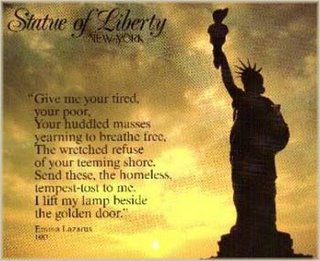
I had so much to say to this man, so much built up but as I looked into his brown Bolivian face words were a luxury neither of us would have that day. In the refuge of our shared silence, I could only hope that somehow he knew what was racing through my mind, what I so badly wanted to tell him but at that time, had no ability, perhaps even no right to say.
If I could look into this native and dark Bolivian face and out of it pull the image of my own family, I hoped he could look back at my pale gringo face and somehow in me, see his own kin. I wanted him to know that the poverty which pretty much was assigned to him at birth because of the location of the world he was born into angered me just as much as when I thought about the wretched poverty so many in my family endured in Ireland. I imagined what it would be like if years from now, my path and his were to cross again, but this time in Chicago or Los Angeles, where he had perhaps attempted to escape a life of poverty to claim what was his right as much as anyone else’s: a chance to feed his children and give them an opportunity at a life other than vicious and dedegradingoverty. And so I imagined seeing him in LA, working some difficult dead end job for little pay and no benefits, and I wanted to let him know that illegal would not be the word I would disdainfully use to describe him. For was not my own great-grandfather an alien in a country that promised opportunity, a treasure in his time he perhaps discovered somewhere behind the many signs and want ads that read ¨Jobs available: Blacks and Irish NEED NOT APPLY! ¨
I do not know the real face of the man I would call my great-grandfather. I know he lived in an impoverished land, escaped it and fled to America in pursuit of something more and for that, faced severe discrimination. He endured so much, even his own child, my grandfather, endured so much for me, and sadly, I do not know what they looked like. But all that got me thinking, imagine if we were able to look at the real human face of poverty and ¨illegal¨ immigration, and political rhetoric aside, we were able to see in that once foreign face our own family who at some time or another struggled against the odds and discrimination to get us where we are today.
I saw my great-grandfather in the face of an impoverished Bolivian today, and against the odds of our cruel and spiteful world, I hope in my face and my experience, he was able to get a glimpse of his own kin. Only when we identify with that face and see our common good linked to theirs will we begin to understand it is the poverty that should be illegal, not the person.
When my great grandfater came to America, he was greeted by these words on the Statue of Liberty..."Give me your tired, your poor, Your huddled masses yearning to breathe free, The wretched refuse of your teeming shore. Send these, the homeless, tempest-tost to me, I lift my lamp beside the golden door"
I wonder if we will put the same words on that gigantic wall we want to build across the Mexican border?


Labels:
Bolivia,
Grandfather,
illegal immigration,
poverty,
Statue of Liberty
Tuesday, October 10, 2006
Fighting Explotation- One Arrest at a Time

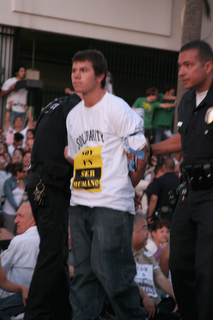
About a week ago a group of students from my former university, Loyola Marymount, joined a couple thousand other people in the busy hotel district next to the international airport to demand dignity and rights for the employees that worked in those buildings. Any more these days, the news I get from the United States is more depressing than inspiring. Perverted congressman and the equally perverted people who protected him. The announcement that the United States plans to build a wall all the way across our country to keep out immigrants, immigrants that want a better life and in turn add to the quality of life in our country. And so, it was with great joy that I came across an article in the LA Times about the protest for human rights and dignity, and in that article, came across a photo of a good friend, Charles Bergman, who joined a sit in on Century Blvd. and for his decisions, was arrested, along with 11 other students.
And so, I read these students explanations as printed in the Los Angeles Loyolan and was incredibly moved and touched. And so, I feel the words expressed by these students are so powerful I want to share them with all of you today, as our country is locked into a debate about immigration. To all of my friends who sat peacefully in the street and spent the night in jail, I am proud and honored to call you friends.
And now, onto their words...
We -- the twelve LMU students and one LMU professor arrested for civil disobedience on Sept. 28 -- are grateful to the Loyolan for their prominent coverage of our efforts on behalf of the Century Blvd. hotel workers. We also applaud the staff for their decision to use the board editorial to voice support for our actions.
Thanks as well to Jeremy Tratner and Brendan Busse, who demonstrated their commitment to this struggle with both their presence and their words in the Oct. 2 issue. In fact, the entire process that led us to spend a night in jail would not have been nearly as powerful if it had not occurred within a community such as LMU, where compassionate engagement with the wider world is prized as an essential component of our mission.
With that said, we would like to add to the conversation with some clarifications. First of all, the front-page news article by Katie Slack that ran last Monday, though admirable in most respects, did a disservice to the event by focusing so heavily on the "counter-protest" by Minutemen volunteers. It should be pointed out that this contingent was miniscule: from our first-hand view, it numbered about a dozen people, compared to over a thousand supporters.
Furthermore, the Minutemen's relentless focus upon the possible "illegality" of some workers ignores the complexity of the issues at hand. We marched and went to jail for the rights of immigrants, certainly. But we also took this action to demand recognition of the basic rights of workers to a safe workplace and a living wage, and to promote the health of families in the Angeleno community of which LMU is a part.
Above all, we were arrested in order to assert our collective opposition to the assumption that it is perfectly acceptable to exploit anyone, at any time and for any reason if it makes you or your company more profitable. It makes a mockery of human dignity to suggest that justice ends at a border fence.
Secondly, asserting again our gratitude for the Loyolan's support, we wish to add some nuance to the portion of their editorial that lumps SLEJ in with "other philanthropic groups." Philanthropy is a noble endeavor and a dire necessity in the non-profit sector, but it is not the intent of either SLEJ or other like-minded organizations (such as Underwings, Magis, Sursum Corda and MEChA, all of which channeled enthusiasm into the protest) to simply contribute money to a good cause.
As Martin Luther King, Jr. says, "Philanthropy is commendable, but it must not cause the philanthropist to overlook the circumstances of economic injustice which make philanthropy necessary." We were motivated to embark on the dramatic act of civil disobedience precisely because the situation on Century Blvd. reveals the structural sinfulness of a situation in which human beings are continually degraded. Xenophobia, racism and fundamental inequalities are not addressed by merely throwing money at the problem -- though we would certainly love to see the airport hotels cough up more money to their employees.
Philanthropy may also, if not pursued in a conscientious manner, bypass the transformational opportunity available in openhearted encounter with the poor and oppressed. Each of us among the arrestees had been prompted to pursue this path at least in part because of our prior experiences of meeting the poor face-to-face and on their own terms.
While we consider ourselves allies of anyone who contributes time, energy or money to tackle the many ills of this world, we believe that our greatest hope resides in our willingness to enter honestly into the suffering endured by the vast majority of our fellow humans. When we are transformed by that encounter, we may then begin to genuinely seek transformation of unjust social structures.
Thank you again to the Loyolan and the entire LMU community for not only their support of our actions, but more importantly, for their support of our sisters and brothers who labor within our very own backyard. It is their story that we hope to bring to light and their struggle with which we stand in solidarity.
This editorial is meant to express the collective opinion of the twelve LMU students and one LMU professor who participated in the act of civil disobedience on Century Blvd. on Sept. 28.
Marian Alonso, Psychology/Music '08
Charles Bergman, Film Production/Theological Studies '07
Erika Cuellar, Liberal Studies/Spanish '08
Richard Espinoza, Assistant Professor of Chicana/o Studies
Andy Etchart, Business '09
Anthony Garcia, English '08
Colin Gilbert, Theological Studies/Spanish '07
Michael Gutierrez, Chicana/o Studies '09
Nicole Gutierrez, Sociology '08
Amanda Johnstone, History/Spanish '07
Sandra Nuñez, Psychology/Chicana/o Studies '07
Melissa Salter, English/Education '08
Nathalie Sanchez, Studio Arts/Art History '07
Labels:
Immigration Rights,
LMU,
Minutemen,
Protest in Los Angeles
Tuesday, October 03, 2006
Cry Without Weeping
I have written about the fun times, the crazy times, and even the hope and inspiration I have found here. But I have written little on the absolute and real poverty that you come in contact with, day in and day out.
This last month could best be described as a time where many times, I am crying without weeping. At last, I wept. I visited an orphanage close to my house for the first time that day. This is my journal entry from that experience.
160 kids, a handful of exhausted employees. Papa, mira aqui. Por favor papa. There are no words that could ever explain the emotions that run through your veins, when, despite your limited Spanish, you understand quite well that these orphans are calling you dad as they cling onto you, thirsty for attention, and even more, hungry for you to take them home. You want to cry on the spot, but you can´t, because you are here to somehow help. So the games go on, the smile more difficult, and the questions more persistent ¨please dad, take me home with you.¨
An hour later I found myself in a room with 30 babies, and 3 employees. A baby cries from the floor, in front of my feet, as I bend down to pick her up, precious little eyes look into mine, and at the slightest touch, the crying ceases. Others around her begin crying, and as I move to pick up the next, the one I was just holding lets out an incredible scream of anguish. And so I stand in the middle of this ¨nursery¨, looking at the babies, dirt and helpless, innocent and yet, in some ways, already ruined, and am forced to make an agonizing decision. Who do you pick up and help, and who do you leave on the floor, screaming and wailing for attention? I have seen some pretty bad realities and yet, nothing will ever prepare a person for the first time they are forced into that decision. And so I reach for the child lying on the floor nearest to my feet, and as he stops crying, I finally begin. There is no build up to this moment, just a flood of emotions that comes crashing through all the defenses I have built up over the month, a sudden, honest, vulnerable release of emotion.
I go home after my time volunteering and at dinner, find myself feeling lonely just by the loneliness I witnessed. At dinner with the whole extended family present, my host sister asks me why I am sad. I am preoccupied studying the face of my host niece, a girl who looks just like another girl I played with in the orphanage. One girl showered with abundant love, the other, void of any. I look up at my sister and I know the expression on my face said that I wanted to tell them everything. But instead of a flow of words, a flow of tears and a voice desperate to scream out, but trapped within by my limitations. I want to tell these people everything, but sadly, I don´t have the language capabilities to express emotion yet, and so I can say nothing, only cry unashamedly before running out the door and into even more lonely streets of impoverishment.
This was my toughest day in Bolivia. Make no mistake, I am happy here. Uninvited, but truly called I believe. But day by day, poco a poco, I expect to find more answers and instead am confronted only with questions and more questions. And so, I don´t know. I have no brilliant insights to share with you today, only incredible frustration, which in the end, is really nothing more than incredible sadness, incredible pain. I came across a quote that said ¨glass shines better when its broken.¨ Metaphorically it sounds great, realistically, I can only hope its true for those kids, and day by day, for myself.
This last month could best be described as a time where many times, I am crying without weeping. At last, I wept. I visited an orphanage close to my house for the first time that day. This is my journal entry from that experience.
160 kids, a handful of exhausted employees. Papa, mira aqui. Por favor papa. There are no words that could ever explain the emotions that run through your veins, when, despite your limited Spanish, you understand quite well that these orphans are calling you dad as they cling onto you, thirsty for attention, and even more, hungry for you to take them home. You want to cry on the spot, but you can´t, because you are here to somehow help. So the games go on, the smile more difficult, and the questions more persistent ¨please dad, take me home with you.¨
An hour later I found myself in a room with 30 babies, and 3 employees. A baby cries from the floor, in front of my feet, as I bend down to pick her up, precious little eyes look into mine, and at the slightest touch, the crying ceases. Others around her begin crying, and as I move to pick up the next, the one I was just holding lets out an incredible scream of anguish. And so I stand in the middle of this ¨nursery¨, looking at the babies, dirt and helpless, innocent and yet, in some ways, already ruined, and am forced to make an agonizing decision. Who do you pick up and help, and who do you leave on the floor, screaming and wailing for attention? I have seen some pretty bad realities and yet, nothing will ever prepare a person for the first time they are forced into that decision. And so I reach for the child lying on the floor nearest to my feet, and as he stops crying, I finally begin. There is no build up to this moment, just a flood of emotions that comes crashing through all the defenses I have built up over the month, a sudden, honest, vulnerable release of emotion.
I go home after my time volunteering and at dinner, find myself feeling lonely just by the loneliness I witnessed. At dinner with the whole extended family present, my host sister asks me why I am sad. I am preoccupied studying the face of my host niece, a girl who looks just like another girl I played with in the orphanage. One girl showered with abundant love, the other, void of any. I look up at my sister and I know the expression on my face said that I wanted to tell them everything. But instead of a flow of words, a flow of tears and a voice desperate to scream out, but trapped within by my limitations. I want to tell these people everything, but sadly, I don´t have the language capabilities to express emotion yet, and so I can say nothing, only cry unashamedly before running out the door and into even more lonely streets of impoverishment.
This was my toughest day in Bolivia. Make no mistake, I am happy here. Uninvited, but truly called I believe. But day by day, poco a poco, I expect to find more answers and instead am confronted only with questions and more questions. And so, I don´t know. I have no brilliant insights to share with you today, only incredible frustration, which in the end, is really nothing more than incredible sadness, incredible pain. I came across a quote that said ¨glass shines better when its broken.¨ Metaphorically it sounds great, realistically, I can only hope its true for those kids, and day by day, for myself.
Subscribe to:
Posts (Atom)